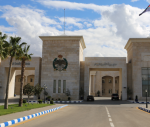You are here
Brazil’s great achievement must survive
Apr 14,2016 - Last updated at Apr 14,2016
If worst comes to worst and Brazil’s President Dilma Rousseff is deposed and her widely beloved predecessor, Luiz “Lula” da Silva is discredited, they will long be remembered for the “Bolsa Familia”.
This is a government programme that cut Brazil’s once appalling poverty rate by half and reduced the number of poor very sharply to 3 per cent of the population.
It reaches 55 million people and 36 million have been lifted out of poverty. It has been such a winner that around 60 countries sent their experts to study it.
Indeed, it has been so successful politically that we should not be surprised that if Rousseff is felled by the shenanigans of congress, masses will go out in the street and riot.
Before the Bolsa Familia programme was put into effect by Lula, Brazil had many welfare and food subsidy programmes.
Like in most developing countries, the benefits did not reach the poor in the way that was intended. Middlemen, black marketeers, corrupt officials and politicians skimmed and diverted much of them.
Bolsa Familia absorbed these into one direct cash payment.
If you were a poor mother of a family — women were more trusted than men — you received an electronic card which you could slip into a bank cash dispenser and immediately get your monthly allowance, often doubling your cash income.
There would be no intermediaries and no skims and no scams.
There were some conditions: children had to go to school, be immunised and have regular health checkups. The mother herself, if pregnant again, had to go to the maternity clinic.
So not only were incomes being raised above the poverty line, but infant and maternal mortality rates fell fast as well.
The income of the poorest 20 per cent of Brazilians rose by 6.2 per cent between 2002 and 2013, while that of the country’s richest 20 per cent rose by only 2.6 per cent. (In the US in the same time period the income of the richest 10 per cent rose by 2.6 per cent and that of the poorest 10 per cent shrank by 8.6 per cent.)
Inoculations reached 99 per cent of the population. Deaths from malnutrition fell by 58 per cent.
Longevity steadily increased. Literacy became almost universal and education gave young people a better chance in life.
The number of children forced to work instead of attending school dropped by 14 per cent.
I have been out to villages in the northeast and saw with my own eyes the visible and dramatic improvements.
I have been visiting the village of Piloezinhos for 40 years and now I saw things that were never there before: a school, a pharmacist and an agricultural adviser.
In homes I found flush toilets, refrigerators and washing machines — this was the kind of thing Bolsa Familia recipients wanted to spend their money on, as well as on medicine and education. Bolsa Familia met with a lot of stiff resistance at its onset.
Some economists argued that the government should be investing in infrastructure. Conservatives warned about the dangers of welfare dependency.
“The opposition said we were going to create an army of lazy people,” Lula told Jonathan Tepperman of Foreign Affairs.
Later, opponents had something of a field day when it was revealed that the sanctions for non-compliance by recipients were not being properly enforced.
Too rapid expansion had meant, for example, that 55 per cent of schools were not reporting if they had met their attendance quotas.
Lula responded by setting up a new ministry to centralise oversight of Bolsa Familia and he made sure it was staffed with experts.
Some half-a-million ineligible recipients were cut from its rolls.
It was to the good. Bolsa Familia became popular across the political spectrum. It helps that the programme is very cheap. By the standards of the middle class, the payments are tiny. The average family gets only $65 a month.
It costs Brazil less than half per cent of the country’s $2.3 trillion national income.
Brazil used to have the worst income distribution in the world, bar South Africa. Now the country’s overall income gap has been reduced by one-third.
Yet, the programme’s popularity extends far outside those it is meant to help. Recent polls put its approval rating at around 75 per cent.
Needless to say, a good deal of this progress was made possible by the rapid economic growth that was made in Lula’s time.
Now, with the sharp drop in commodity prices, notably affecting exports to China, combined with poor economic decision making, the economy has crashed.
Unemployment is rising. Although Rousseff has expanded the reach of Bolsa Familia, the number of poor is probably rising since unemployment is increasing by the day.
While she remains in power, the commitment to extend and improve the reach of Bolsa Familia will remain intact.
If she is deposed, anti-poverty programmes will no longer be a priority. This alone is a good enough reason to make sure she is not impeached.













